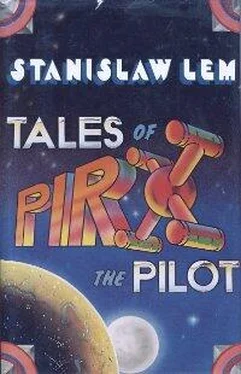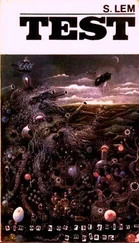“Zero!” a voice blared in his earphones. All at once Pirx heard a muffled but prolonged rumble, his contour couch shook, and flickers of light snaked across the glass canopy, under which he lay staring up at the ceiling panel, taking readings: astrograph, air-cooling gauges, main-stage thrusters, sustaining and vernier jets, neutron flux density, isotopic contamination gauge, not to speak of the eighteen other instruments designed almost exclusively to monitor the booster’s performance. The vibrations then began to slacken, the sheet of racket tapered off overhead, and the thunderous roar grew fainter, more like a distant thunderstorm, before giving way to a dead silence.
Then—a hissing and a humming, but so sudden he had hardly any time to panic. The automatic sequencer had activated the previously dormant screens, which were always disconnected by remote control to protect the camera lenses from being damaged by the blinding atomic blast of a nearby launch.
These automatic controls are pretty nifty, thought Pirx. He was still miles away in his thoughts when his hair suddenly stood on end underneath his dome-shaped helmet.
My Gawd, I’m next, now it’s my turn! suddenly flashed through his mind.
Instantaneously, he started getting the lift-off controls into ready position, manipulating each of them with his fingers in the proper sequence and counting to himself: “One, two three… Now where’s the fourth? There it is… okay… now for the gauge… then the pedal… No, not the pedal—the handgrip… First the red one and then the green one… Now for the automatic sequencer… right… Or was it the other way around—first green, then red…?!”
“Pilot Pirx aboard AMU-27!” The voice booming into his ear roused him from his predicament. “Lift-off on automatic countdown of zero! Attention, are you ready, pilot?”
“Not yet!” he felt like yelling, but said instead:
“Pilot Boer… Pilot Pirx aboard AMU-27 and ready for—uh—lift-off on automatic countdown of zero.”
He had been on the verge of saying “Pilot Boerst” because he still had Boerst’s words fresh in his memory. “You nut,” he said to himself in the ensuing silence. Then the automatic countdown—why did these recorded voices always have to sound like an NCO?—barked:
“Minus sixteen, fifteen, fourteen…”
Pirx broke out in a cold sweat. There was something he was forgetting, something terribly important, a matter of life and death.
“…six, five, four…”
His sweaty fingers squeezed the handgrip. Luckily it had a rough finish. Does everyone work up such a sweat? he wondered. Probably—it crossed his mind just before the earphones snarled:
“Zero!!!”
His left hand—instinctively—pulled back on the lever until it reached the halfway mark. There was a terrific blast, and his chest and skull were flattened by some resilient, rubber-like press. The booster! was his last thought before his eyesight began to dim. But only a little, and then not for long. Gradually his vision improved, though the unrelenting pressure had spread to the rest of his body. Before long he could make out all the video screens—at least the three opposite him—now inundated with a torrent of milk gushing from a million overturned cans.
I must be breaking through the clouds, he thought. His mind, though somewhat slower on the uptake, was totally relaxed. As time went by, he felt increasingly like a spectator to some strange comedy. There he was, lying fiat on his back in his “dentist’s chair,” arms and legs paralyzed, not a cloud in sight, surrounded by a phony pastel-blue sky… Hey, were those stars over there, or what?
Stars they were. Meanwhile the gauges were working steadily away—on the ceiling, on the walls—each in its own way, each with a different function to perform. And he was supposed to monitor each and every one of them—and with two eyes, no less! At the sound of a bleeping signal in his earphones, his left hand—again by instinct—fired the booster separation, immediately lowering the pressure. He was cruising at a velocity of 7.1 kilometers per second, he was at an altitude of 201 kilometers, and his acceleration was 1.9 as he pitched out of his assigned launch path. Now he could afford to relax a while, but not for long, because pretty soon he would have his hands full—and how!
He was just starting to make himself comfortable, pressing the armrest to raise the seat in back, when he suddenly went numb all over.
“The crib! Where’s the cribsheet!”
This was that awfully important detail he couldn’t remember at the time. He scoured the deck with his eyes, now totally oblivious of the swarm of pulsating gauges. The cribsheet had slipped down under the contour couch. He tried to bend over, was held back by his torso straps; without a moment to lose, with a sinking sensation as if perched on top of some collapsing tower, he flipped open his navigation book—which until now had been stored in his thigh pocket—and yanked the flight plan from the envelope. A mental blackout. Where the hell was orbit B68, anyway? That must be it there! He checked the trajectory and went into a roll. Much to his surprise, it worked.
Once he found himself.on an elliptical path, the computer graciously presented him with the correctional data; he maneuvered accordingly, overshot his orbit, and braked so suddenly that he dropped down to -3g for a period of ten seconds, the negative gravity having little effect on him because of his exceptional physical endurance (“If your brain were half as strong as your biceps,” Bullpen once told him, “you’d have been really something”); guided by the correctional data, he pitched into a stable orbit and fed the computer, but the only output was a series of oscillating standing waves. He yelled out the figures again, only to discover that he had neglected to switch over; that remedied, the CRT showed a flickering vertical line and the windows flashed a series of ones. “I’m in orbit!” he piped with glee. But the computer indicated an orbital period of four hours and twenty-nine minutes, instead of the projected four hours and twenty-six minutes. Was that a tolerable deviation? he wondered, desperately searching his memory. He was all set to unbuckle the straps—the cribsheet was still lying underneath the seat, though a damned lot of good it would do him if the answer wasn’t there—when Professor Kaahl’s words suddenly came to mind: “All orbits are programmed with a built-in margin of error of 0.3 percent.” But just to play it safe, he fed the data into the computer, to learn that he was right on the borderline. “Well, that’s that,” he sighed, and for the first time he began surveying his surroundings.
Being strapped to his seat, except for a feeling of weight-lessness, he hardly noticed the loss of gravitation. The forward screen was blanketed with stars, with a brilliant white border skirting the very bottom. The lateral screens showed nothing but a star-studded black void. But the deck screen—ah! Earth was now so immense that it took up the whole screen, and he feasted his eyes on it as he flew over at an altitude of 700 kilometers at perigee and 2,400 kilometers at apogee. Hey, wasn’t that Greenland down there? But before he could verify that it was, he was already sailing over northern Canada. The North Pole was capped with iridescent snow, the ocean stood out round and smooth—violet-black, like cast iron—there were strangely few clouds, and what few there were looked like gobs of watery mush splattered on top of Earth’s highest elevation points.
He glanced at the clock. He had been spaceborne for exactly seventeen minutes.
It was time to pick up PAL’s radio signal, to start monitoring the radar screens as he passed through the satellite’s contact zone. Now, what were their names again? RO? No—JO. And let’s see, their numbers were… He glanced down at the flight plan, stuck it back into his pocket along with the navigation book, and turned up the intercom on his chest. At first there was just a lot of screeching and crackling—cosmic interference. What system was PAL using? Oh, yeah—Morse. He listened closely, his eyes glued to the video screens, and watched as Earth slowly revolved beneath him and stars scudded by—but no PAL. Then he heard a buzzing noise.
Читать дальше












